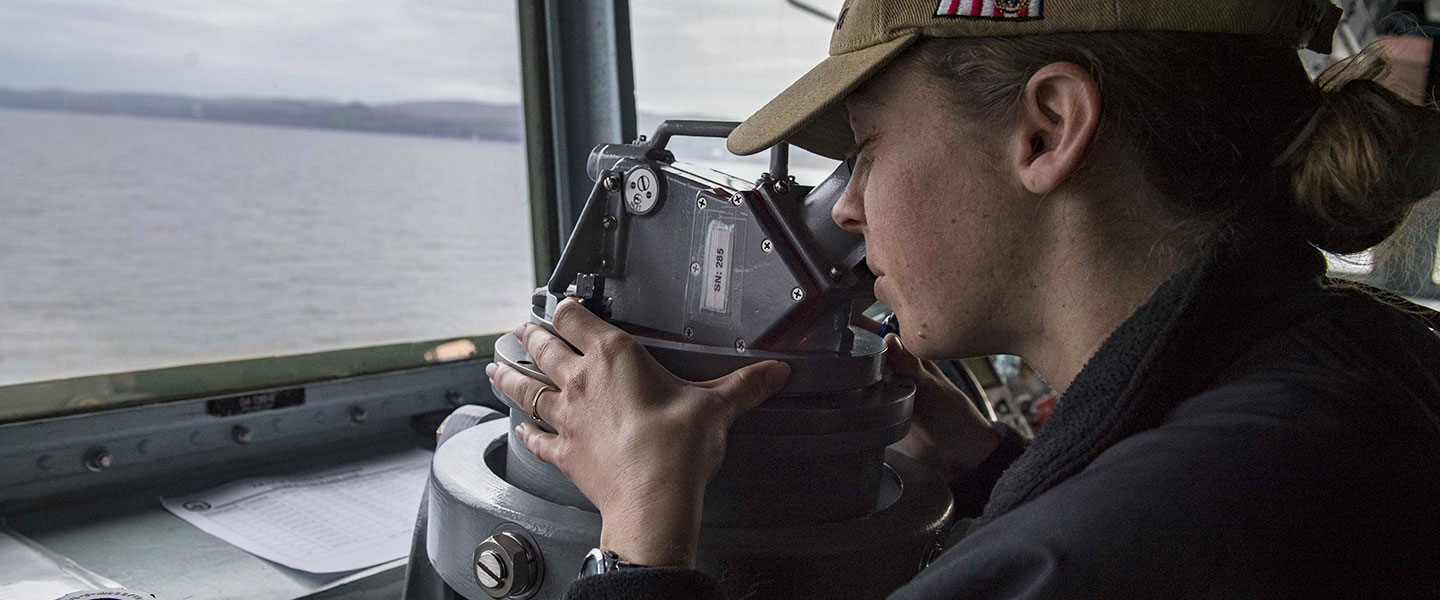More Information
Responsibilities
As an Intelligence Officer, you will take on a wide variety of assignments, each one essential in its related mission or objective. This role may include:
- Leading the planning, development, testing and deployment of information systems crucial to the intelligence process
- Monitoring and analyzing maritime activities that pose a threat to national security, such as drug smuggling, illegal immigration, arms transfers, environmental mishaps and violations of UN sanctions
- Delivering real-time operational intelligence assessment to high-level decision makers
- Planning intelligence operations including threat analysis for pre-strike missions and direct action missions
- Managing intelligence systems
- Enabling the collection of human intelligence
- Overseeing the work of Intelligence Specialists – Enlisted Sailors (no degree required) who help convert information into intelligence
Work Environment
Depending on interests, background and performance, Intelligence Officers have opportunities to serve worldwide aboard ships, on bases and installations or even in assignments at Joint Intelligence Centers.
Training & Advancement
Those pursuing an Intelligence Officer position are required to attend Officer Candidate School (OCS) in Newport, RI.
Upon completion, they attend a five-month basic course of instruction at the Center for Information Dominance in Dam Neck, VA, where they receive training in: electronic, anti-submarine, anti-surface, anti-air, amphibious and strike warfare; counterintelligence; strategic intelligence; air defense analysis and combat mission planning.
From there, Intel Officers embark on a 30-month operational fleet tour. This is typically an assignment with an aviation squadron, with an air wing staff or onboard an aircraft carrier or amphibious command ship.
Promotion opportunities are regularly available but competitive and based on performance.
Post-Service Opportunities
Specialized training received and work experience gained in the course of service can lead to valuable credentialing and occupational opportunities in related fields in the civilian sector.
Education Opportunities
Wherever you are in your professional career, the Navy can help ease your financial burdens and advance your career with generous financial assistance and continuing education programs. Beyond professional credentials and certifications, Intelligence Officers can advance their education by:
- Pursuing opportunities at institutions such as Naval Postgraduate School (NPS) or Navy War College (NWC)
- Completing Joint Professional Military Education (JPME) at one of the various service colleges
Qualifications & Requirements
A degree from a four-year college or university is a minimum educational requirement to become a Commissioned Officer. Candidates seeking an Information Professional Officer position should preferably have a degree that focuses on areas of study such as: international relations, political science, government, engineering, physical science, natural science, computer science or other academic fields related to intelligence. All candidates must also be: U.S. citizens, willing to serve worldwide and eligible for a special intelligence security clearance.
General qualifications may vary depending upon whether you’re currently serving, whether you’ve served before or whether you’ve never served before.
Part-Time Opportunities
There are part-time opportunities available as an Intelligence Officer.
Serving part-time as a Navy Reserve Sailor, your duties will be carried out during your scheduled drilling and training periods. During monthly drilling, Intelligence Officers in the Navy Reserve typically work at a location close to their homes.
For annual training, Intelligence Officers may serve anywhere in the world, whether on a ship at sea or at bases and installations on shore.
Take a moment to learn more about the general roles and responsibilities of Navy Reserve Sailors.
Most of what you do in the Navy Reserve is considered training. The basic Navy Reserve commitment involves training a minimum of one weekend a month (referred to as drilling) and two weeks a year (referred to as Annual Training) – or the equivalent of that.
Intelligence Officers in the Navy Reserve serve in an Officer role. Before receiving the ongoing professional training that comes with this job, initial training requirements must first be met.
For current or former Navy Officers (NAVET): Prior experience satisfies the initial leadership training requirement – so you will not need to go through Officer Training again.
Officers who previously held a commission in another United States Military Service, National Oceanic and Atmospheric Administration, Public Health Service, or United States Coast Guard are exempt from attending ODS or LDO/CWO Academy.
